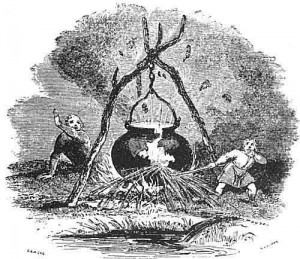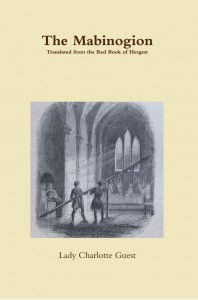The Birth of Taliesin

Caridwen’s Cauldron
In times past there lived in Penllyn a man of gentle lineage, named Tegid Voel, and his wife, Caridwen. And there was born to him of his wife a son the most ill-favoured man in the world, Avagddu. Now Caridwen thought that he was not likely to be admitted among men of noble birth, by reason of his ugliness, unless he had some exalted merits or knowledge.
So she resolved to boil a cauldron of Inspiration and Science for her son, that his reception might be honourable because of his knowledge of the mysteries of the future state of the world.
Then she began to boil the cauldron, which from the beginning of its boiling might not cease to boil for a year and a day, until three blessed drops were obtained of the grace of inspiration.
She put Gwion Bach the son of Gwreang of Llanfair, to stir the cauldron, and a blind man named Morda to kindle the fire beneath it, and she charged them that they should not suffer it to cease boiling for the space of a year and a day. And she herself, according to the books of the astronomers, and in planetary hours, gathered every day of all charm-bearing herbs.
Towards the end of that year it chanced that the three drops of charmed liquor flew out of the cauldron and fell upon the finger of Gwion Bach. As the hot liquid scalded his finger he put it to his mouth, and he foresaw everything that was to come, and perceived that his chief care must be to guard against the wiles of Caridwen, for vast was her skill.
In very great fear he fled towards his own land. As he ran, the cauldron burst in two, spilling the poisonous liquor that remained.
Caridwen saw all the toil of the whole year lost and chased after Gwion Bach.
He changed himself into a hare and fled. But she changed herself into a greyhound and turned him.
He ran towards a river, and became a fish. And she in the form of an otter chased him under the water.
He turned himself into a bird of the air. Then she, as a hawk, followed him and gave him no rest in the sky.
And just as she was about to stoop upon him, and he was in fear of death, he espied a heap of winnowed wheat on the floor of a barn, and he dropped amongst the wheat, and turned himself into one of the grains.
Then she transformed herself into a high-crested black hen, and went to the wheat and scratched it with her feet, and found him out and swallowed him.
Ceridwen bore him nine months, and when he was reborn she could not find it in her heart to kill him. So she wrapped him in a leather bag, and cast him into the sea to the mercy of God.
Elphin son of King Gwyddno was the most hapless of youths, and it grieved his father that bad luck followed his son.
Gwyddno owned a weir near Aberystwyth and it was tradition that each May eve the honour of retrieving the catch was given to one of his subjects, and the value of an hundred pounds was taken each year. With the advice of his council, Gwyddno resolved that this year Elphin would be the one to reap the rewards of the weir in the hope that it would turn his son’s luck.
But on the appointed day, when Elphin went to look, there was nothing in the weir. But as he turned back he perceived the leather bag upon a pole of the weir. Then one of the weir-wards said to Elphin, “You have destroyed the virtues of the weir, which always yielded the value of an hundred pounds every May eve, and tonight there is nothing but this leather skin within it.”
“But there may be the value of an hundred pounds within this bag,” Said Elphin and he opened it to reveal the forehead of the boy.
“Behold a radiant brow!, Taliesin be he called,” said Elphin. And he lifted the boy in his arms, and lamenting his mischance, he placed him sorrowfully behind him. And he made his horse amble gently home so that his new found son would not be disturbed. Presently the baby spoke and foretold honour to Elphin;
“Fair Elphin cease to lament!
Let no one be dissatisfied with his own,
To despair will bring no advantage.
No man sees what supports him;
The prayer of Cynllo will not be in vain;
God will not violate his promise.
Never in Gwyddno’s weir
Was there such good luck as this night.
Fair Elphin, dry thy cheeks!
Being too sad will not avail,
Although thou thinkest thou hast no gain,
Too much grief will bring thee no good;
Nor doubt the miracles of the Almighty:
Although I am but little, I am highly gifted.
From seas, and from mountains,
And from the depths of rivers,
God brings wealth to the fortunate man.
Elphin of lively qualities,
Thy resolution is unmanly;
Thou must not be over sorrowful:
Better to trust in God than to forbode ill.
Weak and small as I am,
On the foaming beach of the ocean,
In the day of trouble, I shall be
Of more service to thee than 300 salmon.
Elphin of notable qualities,
Be not displeased at thy misfortune;
Although reclined thus weak in my bag,
There lies a virtue in my tongue.
While I continue thy protector
Thou hast not much to fear;
Remembering the names of the Trinity,
None shall be able to harm thee.”
And this was the first poem that Taliesin ever sang, being to console Elphin in his grief for that the produce of the weir was lost, and, what was worse, that all the world would consider that it was through his fault and ill-luck.
When Elphin returned to his father’s court Gwyddno asked him if he had had a good haul at the weir, and he told him that he had got that which was better than fish.
“What was that?” said Gwyddno.
“A Bard,” answered Elphin.

